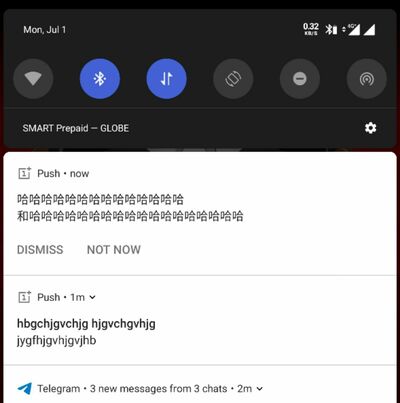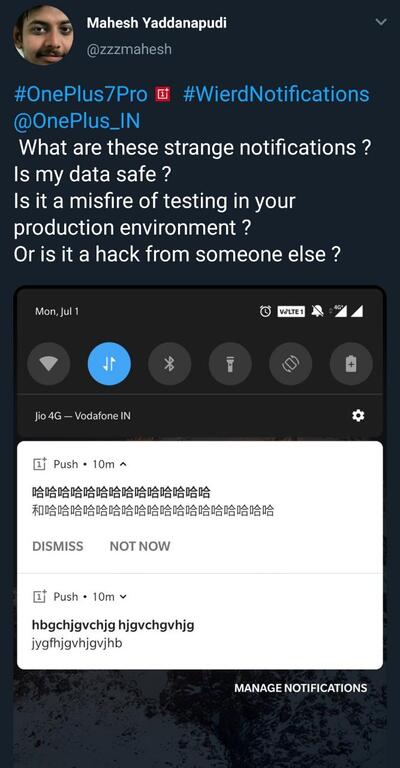Imagine OnePlus without controversies. Simple answer – you can’t! Be it the ‘Smash the Past‘ contest while releasing OnePlus One, or bundling a mysterious app in OxygenOS – the saga is just too long to remember!

The newest candidate in this list is a pair of random notifications, allegedly appearing on the phones of OnePlus 7 Pro owners across the world.

As you can see, both of these bizarre notifications are originated from OnePlus’ own Push service. The initial one consists of random English letters, whereas the second one contains Chinese (?) characters.

Besides social media platforms, the official OnePlus forum is literally getting overflowed by countless reports from the confused OnePlus users. A combined mega thread can be found here, where David Y., Global Community Manager of OnePlus, has shared the following info:
During an internal test, our OxygenOS team accidentally sent out a global push notification to some OnePlus 7 Pro owners. We would like to apologize for any difficulties, and assure you that our team is currently investigating the error. We’ll share more information soon.
(Source)
The following tweet has been posted from the official Twitter handle of OnePlus, iterating a similar set of words.

Perhaps an intern unknowingly pushed the red button for sending global notifications. Guess they need to upgrade the security protocols. ?
Update
OnePlus has issued an official statement under the Announcement section of of their forum.
We sincerely apologize for the two accidental notification push messages that some OnePlus 7 Pro users received 2 hours ago.
As soon as we noticed the mistake, we performed a round of in-depth investigations with the related teams to identify the cause. The push messages occurred while the OxygenOS team was conducting a software test for the upcoming Android Q system update. Due to an error during the testing process, we accidentally pushed a routine test message to some of our OnePlus 7 Pro OxygenOS users.
The notification push function is designed mainly as a survey tool to help us better understand our users’ feedback and to further improve the user experience, and is based on the Google FCM (Firebase Cloud Messaging) Protocol. Therefore, we want to reassure that this incident does not indicate any risks for your personal data.
We are immediately implementing new processes to ensure this cannot happen again.
Never Settle
A sincere and well-written apology – no doubt in that. But the highlighted part is rather interesting: OnePlus is already testing Android Q based OxygenOS (10?) OTA via their internal network. Do you think the closed beta for OnePlus 7 series will be based on Android Q? Comment below.
PiunikaWeb is a unique initiative that mainly focuses on investigative journalism. This means we do a lot of hard work to come up with news stories that are either ‘exclusive,’ ‘breaking,’ or ‘curated’ in nature. Perhaps that’s the reason our work has been picked by the likes of Forbes, Foxnews, Gizmodo, TechCrunch, Engadget, The Verge, Macrumors, and more. Do take a tour of our website to get a feel of our work. And if you like what we do, stay connected with us on Twitter (@PiunikaWeb) and other social media channels to receive timely updates on stories we publish.

![[Update: Official statement] Getting weird notifications on your OnePlus 7 Pro? Here's what you should know [Update: Official statement] Getting weird notifications on your OnePlus 7 Pro? Here's what you should know](https://piunikaweb.com/wp-content/uploads/2019/07/oneplus_notifications_bug_banner.jpg)

